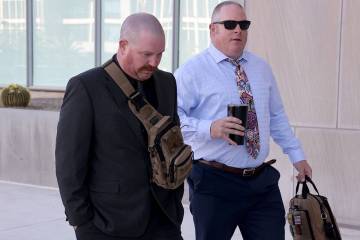Federal judge rejects UMC’s bid to seal records in lawsuit
A federal judge has rejected University Medical Center’s bid to seal the public hospital’s records that are part of a class-action federal lawsuit, ruling that there is a “strong presumption of public access to judicial files” and the public has a “right to know why enormous sums have been spent at public expense.”
It’s the latest development in a high-stakes lawsuit where millions of dollars hang in the balance.
UMC attorneys filed a motion to seal hospital records and other exhibits attached to a court-appointed special master’s report that was critical of UMC’s efforts to provide electronic records for the discovery phase of the lawsuit. The lawsuit, involving about 600 current and former UMC staffers, stems from allegations that staffers didn’t get paid while working during lunch breaks. In her ruling, U.S. Magistrate Judge Peggy Leen noted that she appointed a special master to investigate on UMC’s compliance with the discovery process only as a “last resort” after months of hearings and efforts to get the hospital to meet its obligations to provide electronically stored information, or ESI.
“UMC is a public hospital. Public funds have been and continue to be expended on the defense of this case,” Leen wrote in her late March ruling. “UMC has paid in excess of $500,000 to the special master fund alone because of its failures to comply with its ESI discovery obligations. There is a strong presumption of public access to judicial files and records. I find the public has a right to know exactly why enormous sums have been spent at public expense.”
The report of special master Daniel Garrie found that UMC officials repeatedly gave false or misleading statements during the process of providing documents and electronic data required to be turned over to plaintiffs in the case. He also found that the hospital lost or deleted electronic data likely relevant to the case, including text messages and other files.
His wide-ranging report came after months of work with UMC that focused on a variety of records, including electronic employee time-keeping systems.
UMC attorneys pushed back, arguing the hospital already has turned in more than 60,000 pages of records and criticizing the special master’s report as too opinionated. But they also have acknowledged shortcomings in open court, such as wiping several Blackberries clean of data when technicians who were unaware of the requirement installed new software. When the data was wiped clean, UMC already had been instructed to preserve evidence.
A UMC spokeswoman declined comment, as it’s pending litigation.
In addition to objecting to the report, UMC attorneys also argued unsuccessfully that exhibits filed with the report should be sealed because they include a “wealth of information” about UMC’s information-technology systems and internal matters, including employee email addresses and job titles. UMC had sought an order seeking to seal records and transcripts filed with the report, though the hospital didn’t seek to seal the underlying report.
The judge rejected those arguments, finding that the hospital attorneys didn’t provide any specific facts to back up their argument for sealing the records.
The stakes are high in the case beyond the half-million-dollar expense of the special master. In a transcript of an Oct. 21 court hearing, Robert Freeman, an attorney for UMC, estimated the case as a “$2 million endeavor” so far. Freeman also noted that accepting the special master’s report and recommendation at face value would be financially devastating for UMC.
In the hearing, Freeman said if the judge were to agree with the special master’s report and rule in favor of the plaintiffs, it would be a “nine-figure verdict.” That’s $100 million or more.
“I don’t see the hospital surviving that,” Freeman said in the time.
At the same hearing, Jon Tostrud, an attorney for the plaintiffs, criticized that comment, calling it a “scare tactic.”
“The people we represent are current employees of UMC,” he said, according to the transcript. “Their paycheck is signed by UMC. They have no interest in seeing UMC become insolvent.”
Leen also wrote that the special master “was only appointed because the court had lost confidence in UMC’s willingness or ability to comply with its discovery obligations with respect to electronically stored information.”
Her sternly worded order made it clear that the expense of a special master could have been avoided.
“Before appointing the special master I gave UMC one final opportunity to comply with its ESI discovery obligations, warning UMC that if it did not I would appoint a special master at UMC’s expense, which I stated on the record I believed would be a ridiculous expense for UMC to incur,” Leen said, adding it was the first time she had appointed a special master in 14 years as a federal judge.
Contact Ben Botkin at bbotkin@reviewjournal.com or 702-405-9781. Find him on Twitter: @BenBotkin1.

















